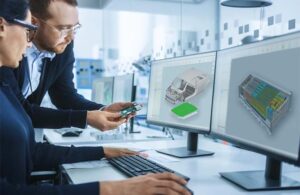 Poised for a quantum jump in the electric vehicles (EVs) segment, India has shown immense potential in the electric mobility industry with the fast adoption of EVs in a short period.
Poised for a quantum jump in the electric vehicles (EVs) segment, India has shown immense potential in the electric mobility industry with the fast adoption of EVs in a short period.
Considering the Vahan Parivahan Portal’s statistics in mind, sales of EVs have taken a high leap of 80% in 2021 compared with last year.
Compared to four-wheelers, India’s EV two-wheeler and three-wheelers are gaining ground much faster.
Despite getting a huge setback against the backdrop of multiple EV fire accidents in India, the high-intensity momentum of electric two and three-wheelers sales have not slowed down much.
This feat could be achieved majorly through the innovative practices of the Internet of Things (IoT) and its influence on the EV industry.
Role of IoT in Electric Vehicles (EVs) Industry can be easily judged by the IoT-enabled services currently in use that help in providing real-time details of EV parts and funding through a dedicated platform.
Apart from providing enough details about the EV sector, IoT in Electric Vehicles (EVs) Industry plays a pivotal role in balancing the shortcomings of current EV technology through its innovative approach.
Role of IoT in Electric Vehicles (EVs) Industry
 Rapidly increasing automation and digitalization have not only revolutionized other industries but have affected electric vehicle space as well.
Rapidly increasing automation and digitalization have not only revolutionized other industries but have affected electric vehicle space as well.
On its path to mass adoption at a huge scale, India has shown a tremendous leap that has astonished many industry experts even without a proper infrastructure in place.
This is all thanks to the evolution of several EV start-ups that sprouted all across the country and integrated IoT-based services in their EVs to stand out in the growing market.
Counting the various shortfalls of current electric vehicles apart from charging infrastructure like the range of the vehicle, security against theft, health parameters of the battery, battery technologies, etc., these start-ups expanded their imaginations to the next level and introduced IoT in Electric Vehicle (EV) offerings to overcome the flaws.
Not only can IoT in Electric Vehicles (EVs) predict the health parameters of the EV battery, but it can also provide real-time maintenance reports of the vehicle to its driver.
By integrating IoT in Electric Vehicles (EVs), we can assimilate a proper IoT ecosystem wherein EV charging stations can always stay connected.
IoT in Electric Vehicles (EVs) Industry- What to Expect?
 BMS Monitoring
BMS Monitoring
Utilizing services of IoT in Electric Vehicles (EVs), ride-sharing, leasing and last-mile delivery companies can monitor the BMS parameters of a vehicle and can generate more revenue. This can be achieved when an IoT device is enabled with various BMS protocols like CAN, UART, RS485, or RS232.
Theft Proofing
Compared to IC engine-based vehicles, electric two-wheelers are prone to theft, as their battery is expensive. IoT in Electric Vehicles (EVs) could assist in more effective tracking. Since EVs are now also being used by bike-sharing and last-mile delivery companies, EVs can be tracked in real-time by using IoT. IoT devices can also raise an alarm and alert the owner once the theft is detected.
Immobilization
Integrating IoT in Electric Vehicles (EVs), one can use this feature of immobilization of the vehicle in case of theft or misuse. Leveraging an immobilizer, an electric vehicle can be controlled with the additional sensor or can be controlled via an app.
Ease of Leasing Batteries
Another IoT feature that adds to the EV offerings includes monitoring battery parameters and location tracking by battery swapping and leasing companies. IoT devices can also track the batteries and prevent the theft and loss of the battery.
Fall Down / Crash Detection
Using IoT devices that comes with built-in accelerometers, one can monitor the acceleration and angle. Therefore, once sudden change in acceleration and angle is detected, the owner or the company can be instantly alerted about a fall down or crash.
Predictive Maintenance
 Leveraging IoT in Electric Vehicles (EVs), we can detect the charge cycle of the vehicle, kilometres travelled, etc.
Leveraging IoT in Electric Vehicles (EVs), we can detect the charge cycle of the vehicle, kilometres travelled, etc.
This collected data can be further used for maintenance of the tires, lubrication cycle, battery life, and monitoring other wear and tear parts of the vehicles.
Work Hours Monitoring
Integrating IoT in Electric Vehicles (EVs), one can monitor forklifts, scissor lifts, and cleaning equipment running time with the simple use of an IoT device. We can also detect a crash or physical impact on expensive equipment using the same IoT device.

